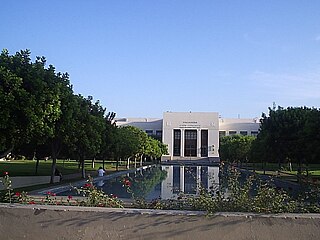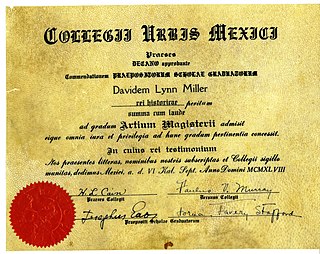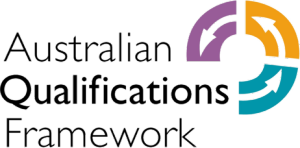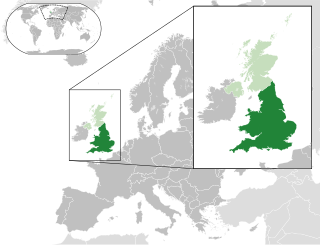
A community college is a type of educational institution. The term can have different meanings in different countries: many community colleges have an "open enrollment" for students who have graduated from high school. The term usually refers to a higher educational institution that provides workforce education and college transfer academic programs. Some institutions maintain athletic teams and dormitories similar to their university counterparts.
An associate degree is an undergraduate degree awarded, primarily in the United States, after a course of post-secondary study lasting two or three years. It is a level of qualification between a high school diploma or GED and a bachelor's degree.

A diploma is a certificate or deed issued by an educational institution, such as college or university, that testifies that the recipient has successfully completed a particular course of study. The word diploma also refers to an academic award which is given after the completion of study in different courses such as diploma in higher education, diploma in graduation or diploma in post graduation etc. Historically, it can also refer to a charter or official document, thus diplomatic, diplomat and diplomacy via the Codex Juris Gentium Diplomaticus.
A graduate diploma is generally a qualification taken after completion of a first degree, although the level of study varies in different countries from being at the same level as the final year of a bachelor's degree to being at a level between a master's degree and a doctorate. In some countries the graduate diploma and postgraduate diploma are synonymous, while in others the postgraduate diploma is a higher qualification.
A higher diploma is an academic award in Iraq, Libya, the United Kingdom, Hong Kong, Ireland and Oman. In Iraq, it's one year after bachelor's degree. In Ireland it is a postgraduate qualification at the same level of the honours bachelor's degree. In the United Kingdom, the diploma is equivalent to higher tier (A*-C) GCSE.
The National Diploma (NDip) was a three-year ab initio specialised higher education qualification in a technology discipline offered by an Institute of Technology or other HETAC designated institution in Ireland.
A postgraduate diploma is a postgraduate qualification awarded after a university degree, which supplements the original degree awarded to the recipient. It can be contrasted with a graduate diploma. Countries that award postgraduate diplomas include but are not limited to Bangladesh, Barbados, Belgium, Brazil, Canada, Chile, Colombia, Germany, Hong Kong, Jamaica, Spain, Kenya, South Africa, India, Ireland, the Netherlands, New Zealand, Nigeria, Republic of Panama the Philippines, Portugal, Russia, Pakistan, Poland, Saudi Arabia, Singapore, Sweden, the United Kingdom, Sri Lanka, Trinidad and Tobago and Zimbabwe. Level of education and recognition differ per issuing country.
A Higher National Diploma (HND) is an academic higher education qualification of the United Kingdom. A qualification of the same title is also offered in Argentina, Finland, India, Malta, Nigeria, Ghana and some other countries with British ties. This qualification can be used to gain entry into universities at an advanced level; it is considered equivalent to a foundation degree or the first two years of a bachelor degree.

The Australian Qualifications Framework (AQF) specifies the standards for educational qualifications in Australia. It is administered nationally by the Australian Government's Department of Industry, with oversight from the States and Territories, through the Standing Council of Tertiary Education Skills and Employment. While the AQF specifies the standards, education and training organisations are authorised by accrediting authorities to issue a qualification.
A Certificate of Higher Education (Cert.H.E./CertHE) is a higher education qualification in the United Kingdom.
A Diploma of Higher Education (DipHE) is a higher education qualification in the United Kingdom. It is awarded after two years of full-time study at a university or other higher education institution and is rated as a Level 5 qualification on both the Regulated Qualifications Framework and the European Qualifications Framework.
A postgraduate certificate (abbreviated as PGCert, PgCert, PG Cert, PGC, or PgC is a postgraduate qualification at the level of a master's degree.

An academic certificate is a document that certifies that a person has received specific education or has passed a test or series of tests.
The Malaysian Qualifications Framework or the MQF is a unified system of post secondary qualifications offered on a national basis in Malaysia. It is administered by the Malaysian Qualifications Agency (MQA), a statutory body under the purview of the Ministry of Higher Education (MOHE).
In the UK education sector, there are a wide range of qualification types offered by the United Kingdom awarding bodies. Qualifications range in size and type, can be academic, vocational or skills-related, and are grouped together into different levels of difficulty. In England, Wales and Northern Ireland, qualifications are divided into Higher Education qualifications, which are on the Framework for Higher Education Qualifications (FHEQ) and are awarded by bodies with degree awarding powers, and Regulated qualifications, which are on the Regulated Qualifications Framework (RQF) and are accredited by Ofqual in England, the Council for the Curriculum, Examinations and Assessment in Northern Ireland and Qualifications Wales in Wales. In Scotland, qualifications are divided into Higher Education qualifications, Scottish Qualifications Authority qualifications and Scottish Vocational Qualifications/Modern Apprenticeships, all of which are on the Scottish Credit and Qualifications Framework (SCQF). Scottish Higher Education Qualifications are on both the SCQF and the FHEQ.
A graduate certificate is an educational credential representing completion of specialized training at the college or university level. A graduate certificate can be awarded by universities upon completion of certain coursework indicating mastering of a specific subject area. Graduate certificates represent training at different levels in different countries and can be at bachelor's degree or master's degree level.
Post-secondary qualifications are qualifications typically studied for after successful completion of secondary school. In Mauritius, this is usually after successful completion of the Higher School Certificate or its equivalent, although select qualifications may permit early school leaving or require additional study. A variety of different post-secondary qualifications are offered in Mauritius.
The national qualification frameworks in the United Kingdom are qualifications frameworks that define and link the levels and credit values of different qualifications.
Post-secondary qualifications are qualifications typically studied for after successful completion of secondary school. In Sri Lanka, this is usually after successful completion of the General Certificate of Education. A variety of different post-secondary qualifications are offered in Sri Lanka.










